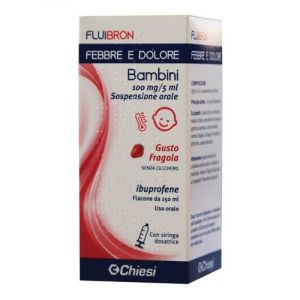Ship in Europe, Find out rates!
Fluibron Febbre e Dolore Sciroppo Per Bambini 100mg/5ml Gusto Fragola 150 ml

- box Delivery in Italy in 24/48 and free returns
- star3.000+ positive reviews
- dropboxOver 60,000 products in the catalog
Therapeutic indications
Symptomatic treatment of fever and mild to moderate pain.
Dosage
The daily dose is structured according to the weight and age of the patient. Undesirable effects can be minimized by using the lowest effective dose for the shortest possible duration of treatment needed to control symptoms (see section 4.4). In children between 3 and 6 months of age, limit administration to those weighing more than 5.6 kg. Oral administration to infants and children aged 3 months to 12 years should be done using the measuring syringe provided with the product. The graduated scale on the body of the syringe highlights the notches for the different dosages; in particular the 2.5 ml notch corresponding to 50 mg of ibuprofen and the 5 ml notch corresponding to 100 mg of ibuprofen. The daily dose of 20–30 mg / kg body weight, divided 3 times a day at 6–8 hour intervals, can be administered according to the following schedule.
| WEIGHT | Age | Single DOSE in ml | maximum number of ADMINISTRATIONS / day |
| 5.6 - 7 Kg | 3 - 6 months | 2.5 ml | 3 in 24 hours |
| 7-10 Kg | 6 - 12 months | 2.5 ml | |
| 10 - 15 Kg | 13 years | 5 ml | |
| 15 - 20 Kg | 4 - 6 years | 7.5ml (5ml + 2.5ml) | |
| 20 - 28 Kg | 7 - 9 years | 10 ml | |
| 28 - 43 Kg | 10 - 12 years | 15 ml |
Overdose
Symptoms of overdose can occur in children who have taken more than 400 mg / kg. The half-life of the drug in the event of an overdose is 1.5–3 hours. Symptoms Most patients who accidentally ingest clinically relevant amounts of NSAIDs develop at most nausea, vomiting, epigastric pain, or rarely diarrhea. Tinnitus, headache, and gastrointestinal bleeding are also possible. In case of ingestion of more important quantities, toxicity of the central nervous system is observed which manifests itself with drowsiness, occasionally excitement and disorientation or coma, convulsions. In more serious cases, metabolic acidosis, prolongation of prothrombin time (INR) may occur. Kidney failure and liver damage can also occur. An exacerbation of the symptoms of the disease may occur in asthmatics. Treatment There is no antidote to ibuprofen. Treatment is symptomatic and consists of suitable support interventions. Maintaining a patent airway and monitoring of cardiac function and vital signs. Particular attention is paid to the control of blood pressure, acid-base balance and any gastrointestinal bleeding. In case of acute overdose, gastric emptying (vomiting or gastric lavage) is all the more effective the earlier it is implemented; the administration of alkali and induction of diuresis may also be useful; ingestion of activated charcoal can help reduce drug absorption.
Contraindications
- Hypersensitivity to ibuprofen or to any of the excipients. - Children under 3 months of age or weighing less than 5.6 kg. - Hypersensitivity to acetylsalicylic acid or to other analgesics, antipyretics, non-steroidal anti-inflammatory drugs (NSAIDs), particularly when hypersensitivity is associated with nasal polyposis and asthma. - Active peptic ulcer. - Severe renal or hepatic insufficiency. - Severe heart failure. - History of gastrointestinal haemorrhage or perforation related to previous active treatments or history of recurrent peptic haemorrhage / ulcer (two or more distinct episodes of proven ulceration or bleeding). - Concomitant use of NSAIDs, including specific COX-2 inhibitors. - Pregnancy and lactation (see section 4.6).
Side effects
The side effects observed with ibuprofen are common to other analgesics, antipyretics, non-steroidal anti-inflammatory drugs. Hypersensitivity reactions Rarely: anaphylactoid reactions (urticaria with or without angioedema), dyspnoea (from laryngeal obstruction or bronchospasm), shock, syndrome characterized by abdominal pain, fever, chills, nausea and vomiting; bronchospasm (see sections 4.3 and 4.4). Gastrointestinal disorders The most commonly observed adverse events are gastrointestinal in nature. Peptic ulcers, gastrointestinal perforation or haemorrhage, sometimes fatal, may occur, particularly in the elderly (see section 4.4). After administration of FLUIBRON FEVER AND PAIN have been reported: nausea, vomiting, diarrhea, flatulence, constipation, dyspepsia, abdominal pain, melaena, haematemesis, ulcerative stomatitis, exacerbation of colitis and Crohn's disease (see section 4.4). Gastritis was observed less frequently. Epigastric pain, heartburn. Gastric upset can be reduced by taking the drug on a full stomach. Rarely: hepatitis, jaundice, abnormal liver function tests, pancreatitis, duodenitis, oesophagitis, hepatorenal syndrome, hepatic necrosis, liver failure. Nervous system and sense organ disorders Vertigo, headache, irritability, tinnitus. Rarely: depression, insomnia, difficulty concentrating, emotional lability, somnolence, aseptic meningitis, convulsions, auditory and visual disturbances. Respiratory, thoracic and mediastinal disorders Rarely: bronchospasm, dyspnoea, apnea. Skin and subcutaneous tissue disorders Bullous reactions including Stevens – Johnson syndrome and toxic epidermal necrolysis (very rarely). Skin rashes (including maculopapular type), itching. Rarely: vesicular-bullous eruptions, urticaria, erythema multiforme, alopecia, exfoliative dermatitis, photosensitivity dermatitis. Blood and lymphatic system disorders Very rarely: neutropenia, agranulocytosis, aplastic anemia, haemolytic anemia (possible positive Coombs test), thrombocytopenia (with or without purpura), eosinophilia, decreased hemoglobin and hematocrit, pancytopenia. Metabolism and nutrition disorders Decreased appetite. Cardiac and vascular disorders Edema, hypertension and heart failure have been reported in association with NSAID treatment. Fluid retention (usually responds promptly to discontinuation of treatment). Very rarely: cerebrovascular accidents, hypotension, congestive heart failure in subjects with impaired heart function, palpitations. Clinical studies and epidemiological data suggest that the use of ibuprofen, especially at high doses (2400 mg / day) and for long-term treatment, may be associated with a modest increased risk of arterial thrombotic events (e.g. myocardial infarction or stroke) (see section 4.4). Renal and urinary disorders Very rarely: acute renal failure in subjects with pre-existing significant renal impairment, papillary necrosis, tubular necrosis, glomerulonephritis, impaired renal function tests, polyuria, cystitis, haematuria. Immune system disorders Single cases of aseptic meningitis symptoms such as neck tension, headache, nausea, vomiting, fever, disorientation have been reported in patients with pre-existing autoimmune diseases (e.g., systemic lupus erythematosus, connective system diseases). paragraph 4.4). Various Rarely: dry eyes and mouth, gum ulcers, rhinitis. "Reporting of suspected adverse reactions. Reporting suspected adverse reactions that occur after authorization of the medicine is important, as it allows for continuous monitoring of the benefit / risk ratio of the medicine. Healthcare professionals are asked to report any suspected adverse reactions through the national reporting system at www.agenziafarmaco.gov.it/it/responsabili ".
Pregnancy and breastfeeding
People under the age of 12 are unlikely to become pregnant, or breastfeed. However, in such circumstances the following considerations must be kept in mind. Inhibition of prostaglandin synthesis can adversely affect pregnancy and / or embryo / fetal development. Results of epidemiological studies suggest an increased risk of miscarriage and cardiac malformation and gastroschisis after use of a prostaglandin synthesis inhibitor in early pregnancy. The absolute risk of cardiac malformations increased from less than 1% to approximately 1.5%. The risk was considered to increase with dose and duration of therapy. In animals, administration of prostaglandin synthesis inhibitors has been shown to cause an increase in pre- and post-implantation loss and embryo-fetal mortality. Furthermore, an increased incidence of various malformations, including cardiovascular, has been reported in animals given prostaglandin synthesis inhibitors during the organogenetic period. During the third trimester of pregnancy, all prostaglandin synthesis inhibitors can expose the fetus to: - cardiopulmonary toxicity (with premature closure of the arterial duct and pulmonary hypertension); - renal dysfunction which can progress to renal failure with oligo-hydroamnios; the mother and the newborn, at the end of pregnancy, to: - possible prolongation of the bleeding time, an antiplatelet effect which can occur even at very low doses; - inhibition of uterine contractions resulting in delayed or prolonged labor.
Special warnings
After three days of treatment without appreciable results, consult your doctor. Undesirable effects can be minimized by using the lowest effective dose for the shortest possible duration of treatment needed to control symptoms (see below on gastrointestinal and cardiovascular risks). The use of FLUIBRON FEVER AND PAIN should be avoided in conjunction with NSAIDs, including selective COX-2 inhibitors. Analgesics, antipyretics, non-steroidal anti-inflammatory drugs can cause hypersensitivity reactions, potentially serious (anaphylactoid reactions), even in subjects not previously exposed to this type of drug. The risk of hypersensitivity reactions after taking ibuprofen is greater in subjects who have experienced such reactions after the use of other analgesics, antipyretics, non-steroidal anti-inflammatory drugs and in subjects with bronchial hyperreactivity (asthma), nasal polyposis or previous episodes of angioedema ( see section 4.2 and section 4.8). Gastrointestinal bleeding, ulceration and perforation: Gastrointestinal bleeding, ulceration and perforation, which can be fatal, have been reported during treatment with all NSAIDs, at any time, with or without warning symptoms or a previous history of serious gastrointestinal events. Elderly: Elderly patients have an increased frequency of adverse reactions to NSAIDs, especially gastrointestinal bleeding and perforation, which can be fatal (see section 4.2). In the elderly and in patients with a history of ulcer, particularly if complicated with haemorrhage or perforation (see section 4.3), the risk of gastrointestinal bleeding, ulceration or perforation is higher with increasing doses of NSAIDs. These patients should start treatment with the lowest available dose. Concomitant use of protective agents (e.g. misoprostol or proton pump inhibitors) should be considered for these patients and also for patients taking low dose aspirin or other drugs that may increase the risk of gastrointestinal events (see section 4.5). Patients with a history of gastrointestinal toxicity, particularly the elderly, should report any unusual gastrointestinal symptoms (especially gastrointestinal bleeding) particularly in the initial stages of treatment. Caution should be exercised in patients taking concomitant medications that may increase the risk of ulceration or bleeding, such as oral corticosteroids, anticoagulants such as warfarin, selective serotonin reuptake inhibitors or antiplatelet agents such as aspirin (see section 4.5). gastrointestinal bleeding or ulceration in patients taking DELIDOR, treatment should be stopped. NSAIDs should be administered with caution to patients with a history of gastrointestinal disease (ulcerative colitis, Crohn's disease) as these conditions may be exacerbated (see section 4.8). Serious skin reactions, some of them fatal, including exfoliative dermatitis, Stevens – Johnson syndrome and toxic epidermal necrolysis, have been reported very rarely in association with the use of NSAIDs (see section 4.8). In the early stages of therapy, patients appear to be at higher risk: the onset of the reaction occurs in most cases within the first month of treatment. FLUIBRON FEVER AND PAIN should be discontinued at the first appearance of skin rash, mucosal lesions or any other signs of hypersensitivity. Caution is required before starting treatment in patients with a history of hypertension and / or heart failure as fluid retention, hypertension and edema have been reported in association with treatment with NSAIDs. Clinical studies and epidemiological data suggest that the use of ibuprofen, especially at high doses (2400 mg / day) and for long-term treatments, may be associated with a modest increased risk of arterial thrombotic events (e.g. myocardial infarction or stroke ). In general, epidemiological studies do not suggest that low doses of ibuprofen (e.g. ≤ 1200 mg / day) are associated with an increased risk of myocardial infarction. Patients with uncontrolled hypertension, congestive heart failure, established ischemic heart disease, peripheral arterial disease and / or cerebrovascular disease should only be treated with ibuprofen after careful consideration. Similar considerations should be made before initiating long-term treatment in patients with risk factors for cardiovascular events (e.g. hypertension, hyperlipidemia, diabetes mellitus, smoking). The use of ibuprofen, acetylsalicylic acid or other analgesics, antipyretics, non-steroidal anti-inflammatory drugs, requires particular caution: - in case of asthma: possible bronchoconstriction; - in the presence of coagulation defects: reduction of coagulability; - in the presence of kidney, heart or hypertension diseases: possible critical reduction of renal function (especially in subjects with impaired renal or hepatic function, heart failure or being treated with diuretics), nephrotoxicity or fluid retention; - in the presence of liver disease: possible hepatotoxicity. - rehydrate the subject before the start and during the course of treatment in case of dehydration (for example due to fever, vomiting or diarrhea); There is a risk of impaired renal function in dehydrated children and adolescents. The following precautions are of relevance during prolonged treatments: - monitor the signs or symptoms of gastrointestinal ulceration or bleeding; - monitor for signs or symptoms of hepatotoxicity; - monitor for signs or symptoms of nephrotoxicity; - if visual disturbances arise (blurred or reduced vision, scotomas, altered color perception): stop the treatment and consult the ophthalmologist; - if signs or symptoms of meningitis arise: evaluate the rare possibility that it is due to the use of ibuprofen (aseptic meningitis; more frequent in subjects with systemic lupus erythematosus or other collagenopathies). Since FLUIBRON FEVER AND PAIN contains maltitol, patients with rare hereditary problems of fructose intolerance should not take this medicine. FLUIBRON FEVER AND PAIN does not contain sugar and is therefore indicated for those patients who need to control the intake of sugars and calories. Each 2.5 ml dose of suspension contains 4.51 mg (0.20 mmol) of sodium; this should be taken into account in cases where a low sodium diet is recommended.
Expiry and Retention
No particular.
Active principles
Each ml of oral suspension contains: Active ingredient: ibuprofen 20 mg. Excipients: 753.30 mg maltitol syrup. For the full list of excipients, see section 6.1.
Excipients
FLUIBRON FEVER AND PAIN Children 100mg / 5ml oral suspension strawberry flavor without sugar Citric acid monohydrate, sodium citrate, acesulfame potassium, xanthan gum, sodium benzoate, strawberry flavor, maltitol syrup, glycerin, purified water FLUIBRON FEVER AND PAIN Children 100mg / 5ml Orange flavor unsweetened oral suspension Citric acid monohydrate, sodium citrate, acesulfame potassium, xanthan gum, sodium benzoate, orange flavor, maltitol syrup, glycerin, purified water
| Destination | Cost | Detail |
|---|---|---|
| Italy | €5,00* | 72H |
| Austria, France, Germany, Slovenia | € 13* | 3 days |
| Belgium, Luxembourg, Portugal, Netherlands, Spain | € 14* | 4 days |
| Bulgary, Cechia, Hungary, Poland, Romania, Slovakia | € 19* | 5 days |
| Denmark, Estonia, Finland, Ireland, Lithuania, Latvia ,Sweden | € 22* | 5 days |
| United Kingdom, Switzerland, Greece, Malta/td> | € 30* | 7 days |
| Canada | € 40 | 7 Days |
European shipments with express courier: FedEx, MBE, DHL
*For the shipment outside band B ther's an extra cost of 22€ *For the shipment outside band C ther's an extra cost of 30€ Delivery Times exclude Saturday and Holidays
For Islands and Areas of difficult Accessibility the shipments are made in 72 hours and the cost will be increased by 15€

